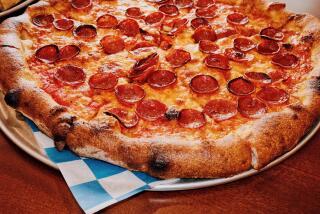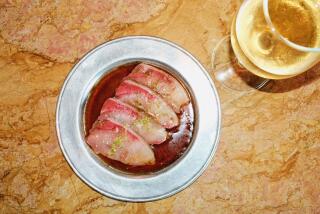Some of L.A.’s best burgers hit the Valley, plus Cobras & Matadors returns and more openings
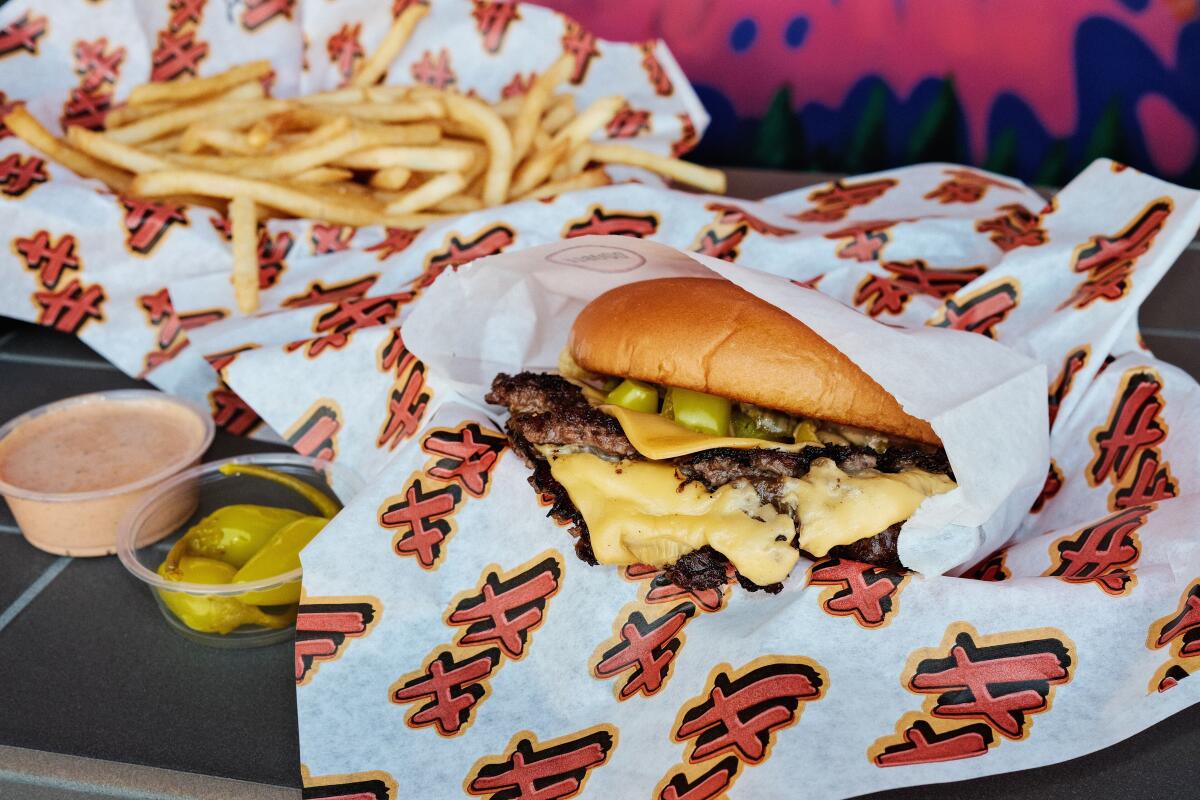
Heavy Handed Studio City
Some of L.A.’s best burgers just landed in the Valley. Santa Monica’s popular smashburger spot Heavy Handed has expanded to Studio City, filling the former Mister O’s space with short-rib patties, indoor and outdoor seating, double the craft beer list and a new soft-serve dip flavor. The brand’s signature orange is eye-catching along Ventura Boulevard, as are the vibrant, psychedelic murals found both indoors and out by local artist DJ Neff.
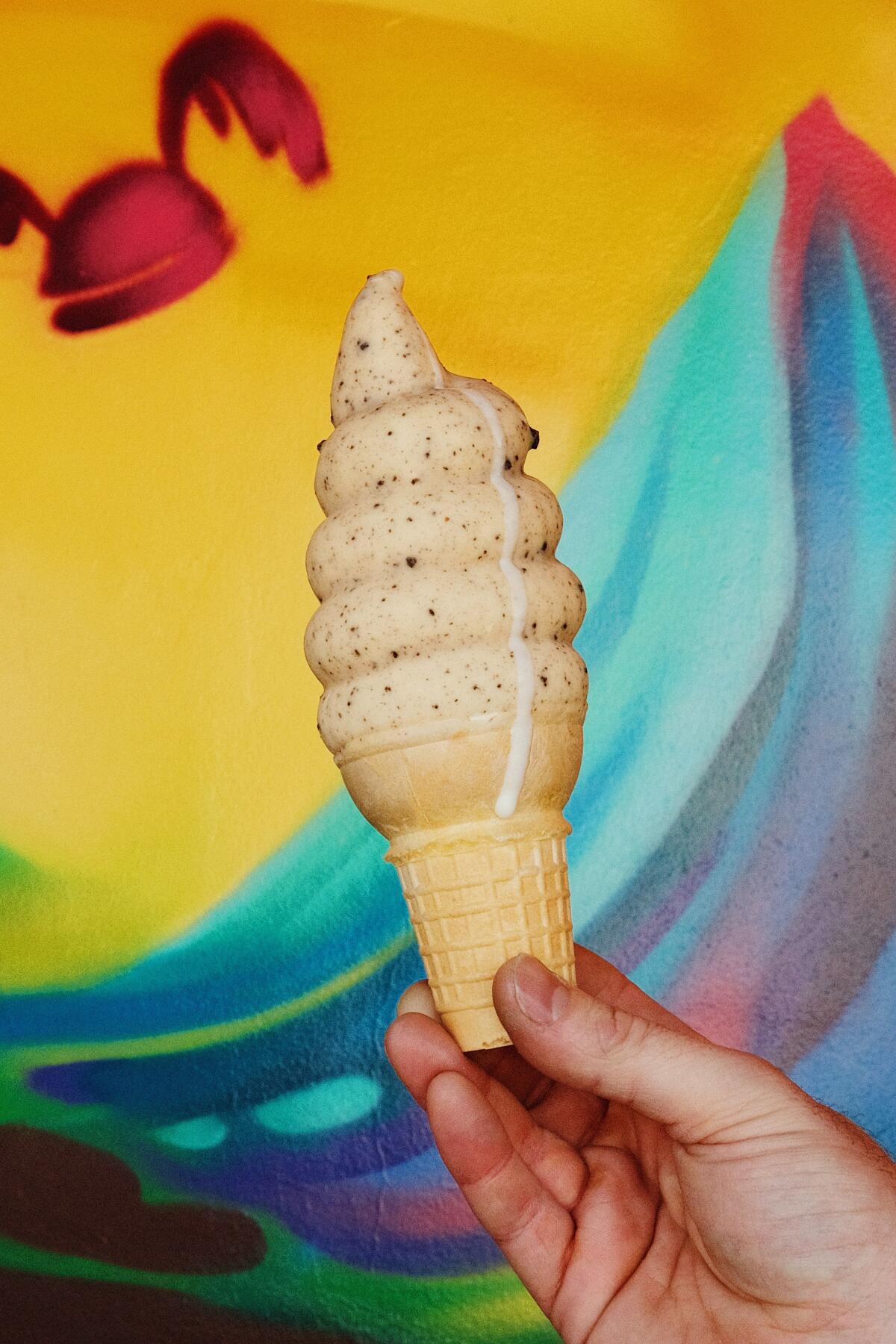
“We wanted to find something that really stood out like a sore thumb and find a standalone [building],” said co-owner Max Miller, who operates the restaurants with Danny Gordon and said that regular lines down the block in Santa Monica almost necessitated a second, larger location. “The way that Heavy Handed has been going with Santa Monica was something Danny and I could only dream of. It’s not what we would have expected, but it’s what we wanted — and even more. We just caught that bug like, ‘Let’s really see what Heavy Handed as a brand can do.’”
The burger shop that began as a popular pandemic pop-up grew to a food truck and then restaurants, and still serves a pared-down menu of American classics: thinly smashed short-rib burgers with American cheese, caramelized onions, house-made pickles and special sauce, plus fries cooked in beef tallow. The Studio City location serves even more beer than its Santa Monica counterpart, with a draft list almost entirely dedicated to local craft brewers. A new house-made cookies-and-cream hard shell for soft serve “that tastes like summer” can also be found here, along with a parking lot.
Gordon and Miller hope to open additional locations, but for now, they’re focusing on Studio City — a neighborhood that’s dear to them. “We’re from the Valley,” said Miller. “We’re Valley guys, so this is good for us.” Heavy Handed is open in Studio City daily from 11:30 a.m. to 10 p.m.
11838 Ventura Blvd., Studio City, heavyhanded.la
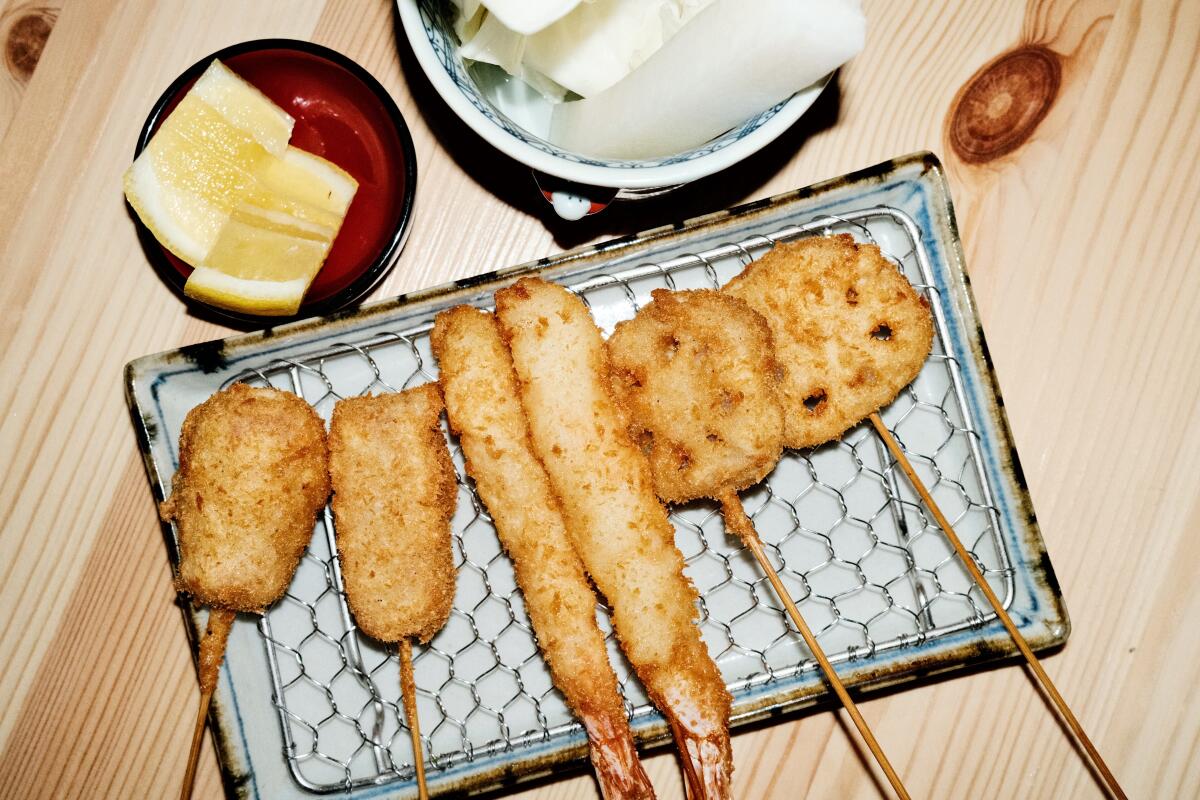
Kushiba
An intimate new Japanese restaurant and bar with a focus on kushikatsu, or fried skewers, is now open from the team behind Michelin-starred Shibumi. At chef-owner David Schlosser’s downtown restaurant kappo-style cuisine and a tasting menu format take center stage, but at Kushiba, his more casual venture, it’s all about Osaka-inspired a la carte skewers and small plates to pair with a range of sake, shochu, highballs and house cocktails. Originally French-trained, Schlosser changed culinary direction after becoming enamored with Japanese cooking, leading him to cook in Tokyo and Kyoto as well as with L.A.’s Hiroyuki Urasawa and Masa Takayama before opening Shibumi in 2016.
Kushiba’s menu showcases technique, but also fun: The lightly battered, panko-crusted vegetable selection includes thickly sliced lotus root and long asparagus spears squiggled with sauce, as well as hearty wedges of Camembert cheese, which ooze once bitten. Meat and seafood kushikatsu offer options such as whole smelt, shiso-wrapped chicken, and thick fillets of flounder, while small plates involve slices of Japanese Wagyu corned beef, bowls of beef-tendon soup, and chopped raw fish such as mackerel with nori. Dave Fernie, also of Shibumi, is leading a beverage program that combines awamori with coconut, cold brew or soda; shochu with umeboshi; and baiju with soda; plus provides customizable shochu drinks with options of sweet potato, rice or barley. Kushiba is open Wednesday to Sunday from 4 p.m. to midnight.
1498 Sunset Blvd., Suite 2, Los Angeles, (213) 266-8891, kushiba.la
Burgette
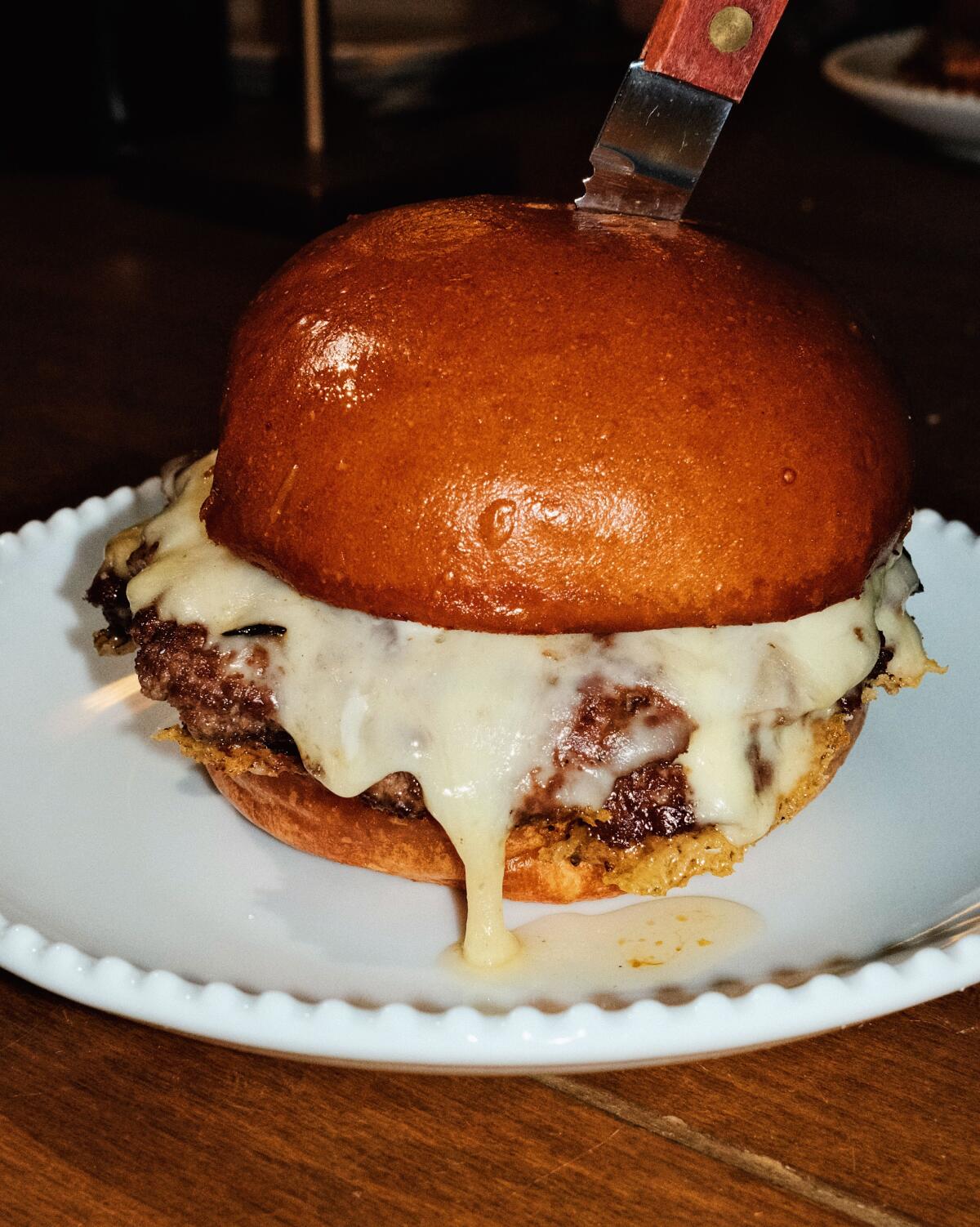
Santa Monica’s new burger destination is stacking Wagyu beef patties and smashed salmon-belly patties blocks from the ocean. Chef Sean MacDonald’s Burgette sits adjacent to his first L.A. restaurant, Bar Monette, and while the restaurant’s signature is the burger, Burgette serves as MacDonald’s ode to Paris in aesthetics and menu — translating to a dimly lit dining room with bistro seating, a bar adorned with copper pots, a nearly entirely French wine list, and a selection of imported charcuterie and cheese. Small plates include options such as wild mushrooms in onion jus with fried rosemary and a blanket of melted gruyère; yuzu-laced haricots verts with fish sauce and toasted almonds; and long-braised beef cheek with Bourguignon jus and bone marrow.
When it came to burgers and sandwiches, MacDonald wanted to flip the familiar on its head: The popular La Vivianne burger involves smoked Wagyu patties, tomato jam, raclette and bone-marrow butter, while the salmon burger tops thin, griddled patties with gribiche-inspired aioli and turnip pickle. A sandwich ode to the famous Cordon Bleu includes crispy chicken with jam, Swiss cheese and asparagus relish. Burgette, which is open Wednesday to Sunday from noon to midnight, also features a 16-seat private dining room with a wall of vintage Champagne flutes for guests to utilize. MacDonald tells The Times that he and his team are already planning more Los Angeles restaurants.
111 Santa Monica Blvd., Santa Monica, (310) 310-8575, burgettesantamonica.com
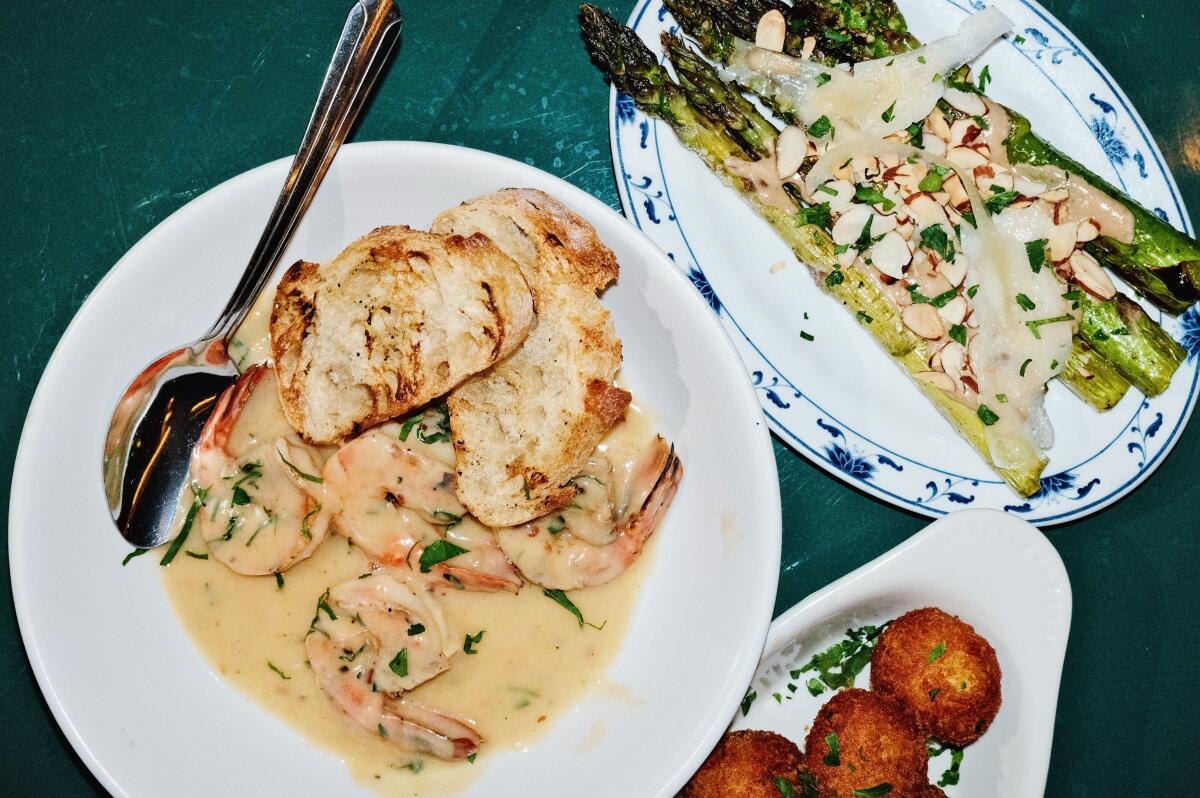
Cobras & Matadors returns
After closing, reopening and closing again, beloved neighborhood Spanish restaurant Cobras & Matadors has returned — this time in the former home of Melrose’s Spartina. Founder Steven Arroyo launched the first iteration more than 20 years ago along Beverly Boulevard; he expanded with an East Hollywood location and shuttered it, and last year, closed the flagship for what many thought was the final time. Then, it quietly reopened.
Ready to close his own restaurant, Spartina chef-owner Stephen Kalt approached Arroyo about taking over the space, and earlier this year, he did. Much of the staff of the Italian restaurant stayed on, including head chef Ronald E. Garcia, and Kalt became a partner in Cobras & Matadors. Now that the tapas-forward restaurant is back it’s serving fan-favorite dishes such as gambas al ajillo, lomo embuchado, albondigas with salsa verde, bacalao fritters and grilled skirt steak under sliced cucumber. Along with the new location comes beer, wine, sangrias and a new cocktail menu with the likes of nopales-tinged martinis, mezcal old-fashioneds, tomatillo micheladas, spicy margaritas and a torched-coconut take on the coquito.
“I told myself, ‘I have every intention of reopening Cobras if it gets what it deserves,’ which is liquor and beer and wine,” Arroyo said. “So this kind of fell in my lap, and I just went for it.” Not having an alcohol license spurred the closure of Arroyo’s previous iteration, after he was busted by LAPD multiple times for allowing guests to bring in their own bottles. “I’d been breaking — not even pushing, but breaking — that law for years,” he said. The time off from Cobras & Matadors also allowed him to focus on his own well-being. Reopening the restaurant while battling personal health issues, he said, has been healing, allowing him to do what he loves: decorating and hosting. Mostly, he’s simply glad to be back.
He decorated the space with paintings and other art from his own home, and is also booking occasional live-music programming with pianists and DJ sets. The new Cobras & Matadors features roughly 100 seats spread across the dining room and the patio, and is open Monday to Saturday from 6 to 10 p.m. Arroyo hopes to begin lunch service in the future, as well as offer specials such as Sunday-only paella.
7505 Melrose Ave., Los Angeles, (323) 782-1023, cobrasandmatadors.la
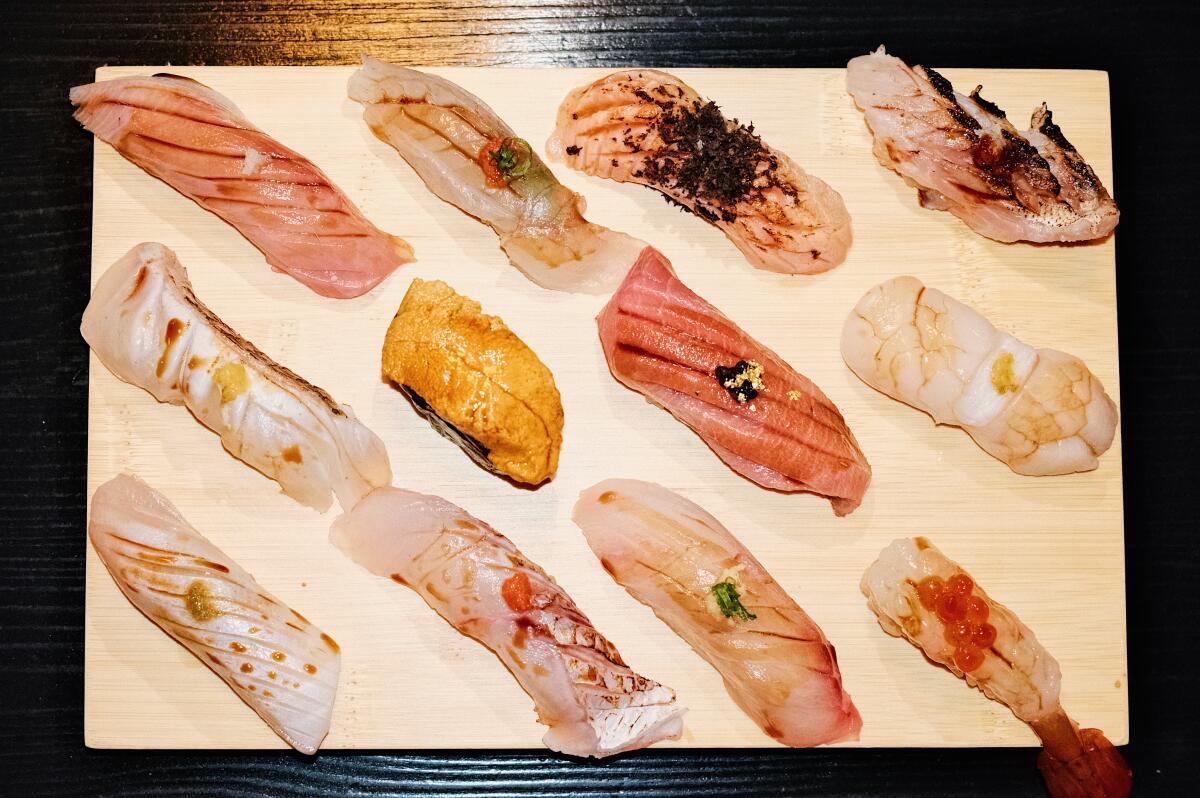
Hato Sushi
A new sushi spot is serving edomae nigiri, sashimi, maki and $55 to $80 omakases from the corner of a Koreatown strip mall. Chef-owner Tony Jin began his culinary career at Park’s BBQ, an L.A. Times Gold Award-winning restaurant, before shifting his focus to sushi and eventually landing at Irori Sushi in Marina Del Rey. At Hato Sushi, his first restaurant, appetizers include classics such as agedashi tofu, karaage, okonomiyaki and tempura, along with new-school items such as caviar-and-gold-topped toro on garlic toast, whitefish-and-purple-yam croquettes, and halibut featuring olive oil, yuzu kosho and kizami. A range of nigiri can be ordered by the single piece or three, maki come in straightforward forms or as elaborate house special rolls, and entrees include udon, hot-stone rice, and an unagi don. The signature items are the sashimi ($75 or $120) or nigiri ($55 or $80) omakases, which Jin adorns with a rotation of toppings and accouterments. Hato Sushi is open daily from 11:30 a.m. to 10 p.m.
209 N. Western Ave., Unit B, Los Angeles, (323) 378-5834, hato-sushi.com
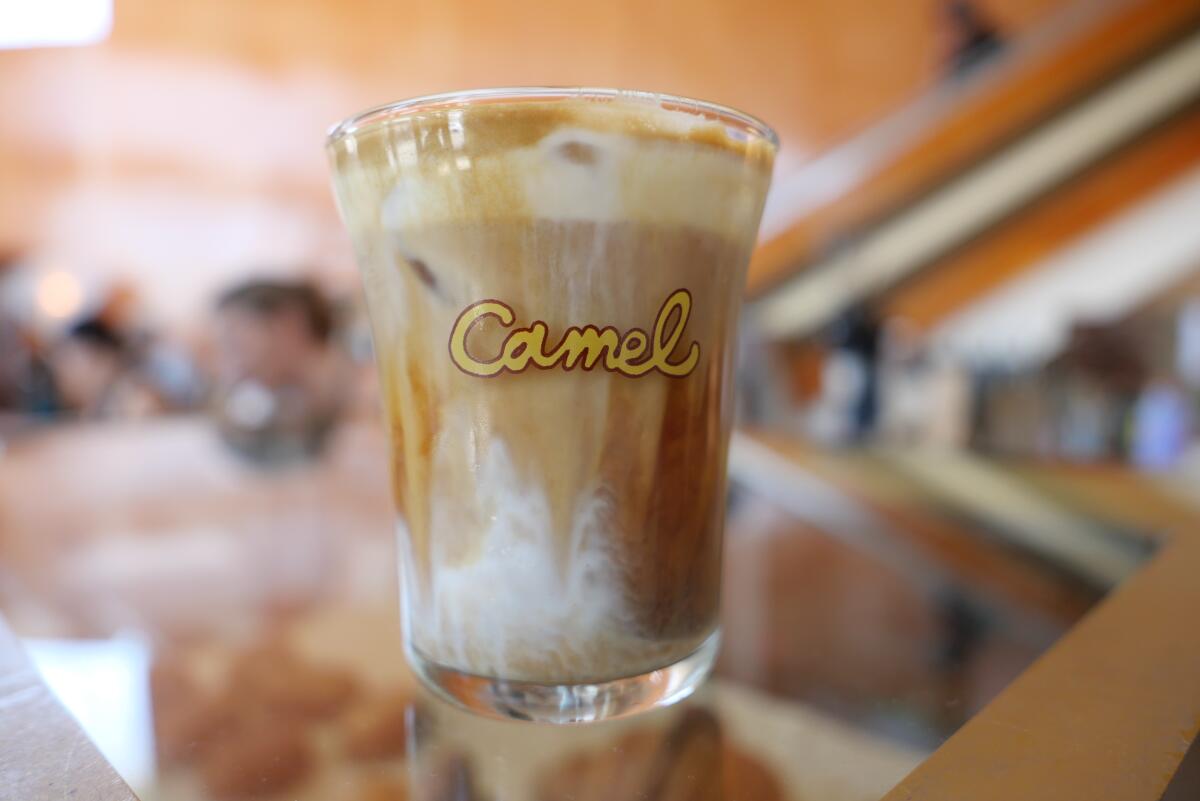
Camel Coffee
Camel Coffee, the new L.A. outpost of the much-loved Korean coffee shop, opened its doors this month across the street from the Vista Theatre. It’s bringing some of Seoul’s hyper-popular cafe culture to a stretch of Sunset Boulevard in Los Feliz along with its TikTok-famous “cream tops” and drinks flavored with misugaru powdered grains. Founded in 2017 by Kanghyun Park (named for the color, not the animal), Camel Coffee has 10 locations in Seoul and one in Busan, and is known for its cream-top drinks — iced or hot coffee with a layer of extra-thick cream — served in stylish cafe spaces.
Owner Alice Kim partnered with Park to open the L.A. location after visiting Camel Coffee in Seoul. “I just love the branding; I felt like Camel takes it to another level,” she says. The interior on Sunset Boulevard features Camel Coffee’s signature brown tones with natural wood finishes and vintage accents. The menu consists of eight coffee drinks, all of the same offerings as its Korean counterparts, with the two additional matcha options. When Kim describes how they make the signature Camel Coffee, she explains, “We pour in the milk first, pull the espresso shot and then top with the cream.” When asked for details about the cream she replies, “It’s a secret recipe. I’m the only one that makes it here.” A vegan cream option is also available. Camel Coffee is open daily from 7:30 a.m. to 4:30 p.m. — Julie Wolfson
4459 Sunset Blvd., Los Angeles, instagram.com/camelcoffee_us
All’Antico Vinaio Koreatown
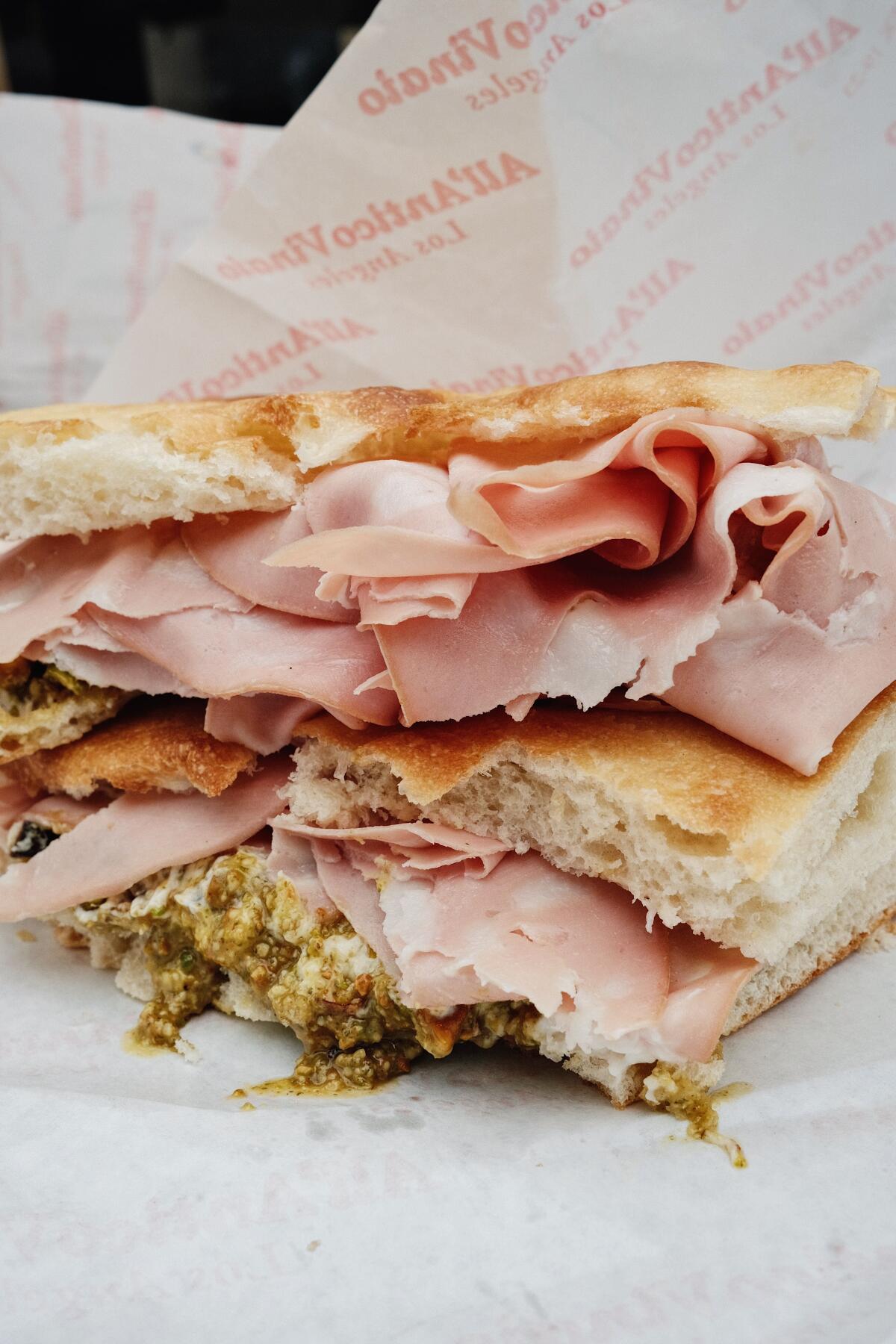
After consistently drawing lines down Abbot Kinney Boulevard since opening its first California sandwich shop last fall, Italy’s All’Antico Vinaio recently expanded to Koreatown with another outpost. The Mazzanti family has overseen the famous Florentine sandwich shop for more than 30 years, slathering large rectangular planks of Tuscan-style schiacciata bread with Pecorino cream, honey, pistachio spread and truffle cream, then piling it with meats such as mortadella, prosciutto, porchetta and capocollo, which get sliced to order, each thin sheet falling directly onto the bread held below the machine. The Koreatown location offers a handful of stools at a high counter, the same sandwich menu found in Venice, a number of daily specials, and wines, spritzes and espresso. All’Antico Vinaio is open in Koreatown daily from 10:30 a.m. to 8 p.m.
3925 W. 6th St., Los Angeles, (213) 277-1196, allanticovinaiousa.com
Gran Blanco revamps
Popular Venice restaurant Gran Blanco recently closed and essentially reopened as an entirely new restaurant. The globally inspired spot under the famous “VENICE” sign that once served burgers, grain salads, kanpachi tacos and crab pasta is now home to modern Japanese cuisine, with options such as chicken katsu curry, yellowtail crudo with yuzu balsamic, and caviar-topped toro on fried nori with miso mustard. Owners Sam Trude and Sam Cooper, who are behind sibling concept Great White, also retooled the beverage menu, which now involves sake, beer and cocktails such as lychee martinis and a tiki-leaning banana-and-yuzu concoction. Gran Blanco is open Wednesday to Thursday from 5 p.m. to midnight; Friday from 5 p.m. to 1 a.m.; Saturday from noon to 1 a.m.; and Sunday from noon to midnight.
80 Windward Ave., Venice, (424) 433-8095, granblanco.com
Freelance writer Julie Wolfson contributed Camel Coffee reporting to this story.
More to Read
Eat your way across L.A.
Get our weekly Tasting Notes newsletter for reviews, news and more.
You may occasionally receive promotional content from the Los Angeles Times.

